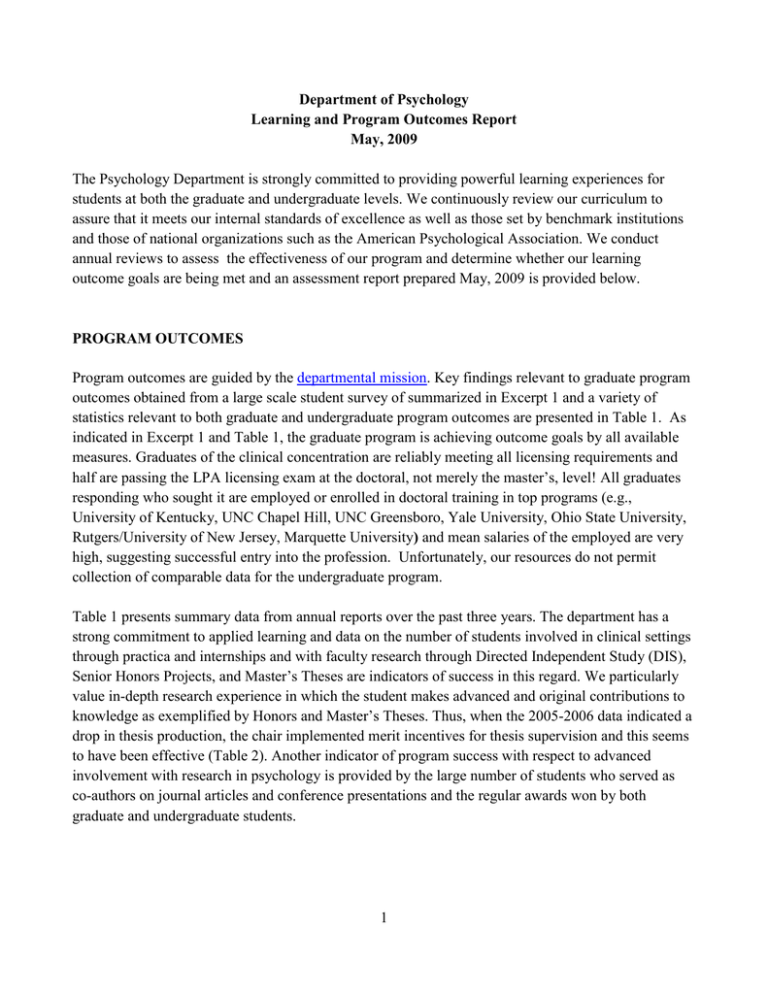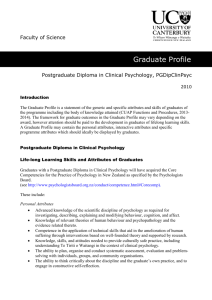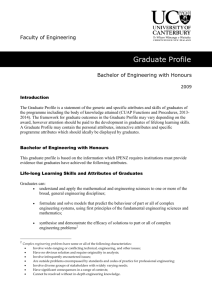The Psychology Department is strongly committed to providing powerful learning... students at both the graduate and undergraduate levels. We continuously... Department of Psychology
advertisement

Department of Psychology Learning and Program Outcomes Report May, 2009 The Psychology Department is strongly committed to providing powerful learning experiences for students at both the graduate and undergraduate levels. We continuously review our curriculum to assure that it meets our internal standards of excellence as well as those set by benchmark institutions and those of national organizations such as the American Psychological Association. We conduct annual reviews to assess the effectiveness of our program and determine whether our learning outcome goals are being met and an assessment report prepared May, 2009 is provided below. PROGRAM OUTCOMES Program outcomes are guided by the departmental mission. Key findings relevant to graduate program outcomes obtained from a large scale student survey of summarized in Excerpt 1 and a variety of statistics relevant to both graduate and undergraduate program outcomes are presented in Table 1. As indicated in Excerpt 1 and Table 1, the graduate program is achieving outcome goals by all available measures. Graduates of the clinical concentration are reliably meeting all licensing requirements and half are passing the LPA licensing exam at the doctoral, not merely the master’s, level! All graduates responding who sought it are employed or enrolled in doctoral training in top programs (e.g., University of Kentucky, UNC Chapel Hill, UNC Greensboro, Yale University, Ohio State University, Rutgers/University of New Jersey, Marquette University) and mean salaries of the employed are very high, suggesting successful entry into the profession. Unfortunately, our resources do not permit collection of comparable data for the undergraduate program. Table 1 presents summary data from annual reports over the past three years. The department has a strong commitment to applied learning and data on the number of students involved in clinical settings through practica and internships and with faculty research through Directed Independent Study (DIS), Senior Honors Projects, and Master’s Theses are indicators of success in this regard. We particularly value in-depth research experience in which the student makes advanced and original contributions to knowledge as exemplified by Honors and Master’s Theses. Thus, when the 2005-2006 data indicated a drop in thesis production, the chair implemented merit incentives for thesis supervision and this seems to have been effective (Table 2). Another indicator of program success with respect to advanced involvement with research in psychology is provided by the large number of students who served as co-authors on journal articles and conference presentations and the regular awards won by both graduate and undergraduate students. 1 Table 1 Table 1 shows program outcomes for the past three years including student awards, number of students involved with applied learning in practicum or internship programs, directed independent studies (DIS), and Senior Honors Projects and Master’s Theses. Additional measures of the quality of applied learning experiences include the number of student co-authors on refereed journal articles and book chapters and student co-presenters at scientific conferences. Data from a survey on placement in graduate and professional programs are presented. Number of graduate students is indicated. Number of majors, pre-majors/minors has been in the vicinity of 600/300 over the past three but these data are based on informal advisee records. 2005-2006 BA Awards Pract/Intern 93 practicum MA National Presentation Award, Schwartz Award Travel Award 6 internships DIS 219 Theses 7 Honors Projects 10 2 Grad Place 22 including two admissions to Med school See Program Review excerpt Authors Presenters 3 student co- 71 student authors in coauthors refereed journals Majors 436 7 student co- 25 student authors in coauthors refereed journals 61 2006-2007 BA Awards Summer Research Award Pract/Intern 78 practicum MA State Presentation Award 5 internships 2007-2008 BA Awards Pract/Intern 70 practicum MA State Presentation Award Schwartz Award 8 internships DIS 156 Theses 14 Honors Projects 20 DIS 168 Theses 7 Honors Projects 23 3 Grad Ad 19 including Penn State, Georgia State, UNCChapel Hill See Program Review excerpt Authors Presenters 7 student co- 69 student authors in coauthors refereed journals Majors 473 13 student co-authors in refereed journals 7 23 student coauthors 69 Grad Ad 24 including Univ Kentucky, UNCG See Program Review excerpt Authors 4 student coauthors in refereed journals 11 student co-authors in refereed journals 7 Presenters 68 student coauthors Majors 510 21 student coauthors 70 1. Excerpted from 2007 Graduate Program Review Program Outcome Data from 2007 Graduate Student Survey During the Fall of 2007, an effort was made to locate the 86 former students who graduated from the program during the reporting period to obtain information about their current professional status. Sixty-six of the graduates were e-mailed to ask if they would be willing to complete a 15 minute survey administered by a current graduate student. Of the 66 graduates who were contacted, 48 agreed and 32 completed the survey. Roughly half of the respondents were in the SATP concentration (17, or 53%) and the remainder were in the General concentration In addition to gathering information about employment and continued education (see Appendix E for a copy of the survey), respondents were also asked to rate their level of satisfaction with the program on a scale of 1 (poor) to 5 (excellent). Generally, the comments of our graduates indicate a high degree of satisfaction with the program. The mean rating on this item was 4.11, with 87% giving ratings of 4 or 5. (Mean GEN = 3.98; Mean SATP = 4.24). Of the 32 graduates interviewed, 19 (59%) described their primary placement as being employed, 11 (35%) are currently (primary placement) in doctoral programs, and 2 are unemployed by choice for family reasons. Nine of the 11 respondents who were currently enrolled in doctoral programs had completed the General Concentration, and two had been SATP students. Twelve of the 17 SATP graduates who responded (71%) took the LPA exam and have received their license. One graduate reported that he has applied to take the exam at the next opportunity. While all 12 passed the LPA exam, half received a score that met or exceeded criteria for doctoral level practice, evidence of a solid preparation in academic psychology. This means that should the psychologist later complete a doctorate in psychology, he or she need not re-take the exam. Two licensed SATP graduates stated that they were not currently working in order to care for young children. The other ten are employed at least part time as psychologists, mostly in private practice. Three have received the LCAS (Licensed Clinical Addictions Specialist). Two SATP respondents were currently in doctoral programs, and two elected not to seek licensure and are clinical research project directors. When asked about concerns about obtaining supervision for clinical practice at the master’s level, three of nine clinicians who responded indicated that this posed some problems, and one expressed difficulties with finding quality supervision. Four of the nine stated that they had had some difficulties obtaining insurance reimbursement. However, this is a common complaint among doctoral level practitioners as well, so the fact that more than half did not report problems may actually be a positive sign. Most SATP graduates indicated at least moderate interest in doing doctoral work, mostly in the area of clinical psychology. Graduates of the SATP concentration reported the highest mean annual salary ($70,385), but only five of the general concentration graduates reported working full time (mean annual salary $49,400) as most were currently in doctoral programs. General concentration graduates reported taking positions as university academic advisors or part time lecturers, engaged in research or teaching at the community college level. Overall, the average salary earned by graduates who participated in the survey was $64,555. Of the 11 respondents who entered doctoral programs, 10 entered PhD programs and one was admitted to a PsyD program. Schools include the University of Kentucky (2), UNC Chapel Hill (3), UNC Greensboro, Yale University, Ohio State University, Rutgers/University of New Jersey, Marquette University of Milwaukee and Spaulding University. Three graduates entered clinical programs, two are in behavioral neuroscience programs, two are in a program in behavioral science 4 and psychopharmacology, and the others are in social psychology, quantitative psychology, special education, and public health. All but one of the students who sought admission to a doctoral program was accepted immediately following graduation from UNCW. One student waited one and a half years because she graduated in December, worked for one year and then applied and was accepted. Most students in doctoral programs reported that their master’s degrees had saved them between one and two years of coursework, and that they had received credit for the master’s thesis. Exceptions were a student in behavioral neuroscience at Yale University, and another student in public health at Rutgers. All survey respondents who were employed reported that their master’s degree was either required or relevant to their jobs. Graduates were also asked to list courses that were most helpful to them at UNCW. SATP graduates tended to list clinical training courses such as psychopathology and Advanced Psychotherapy. General concentration graduates most often listed statistics and core courses. When asked about courses they wished had been covered, students tended to respond according to concentration as well. SATP graduates tended to mention “more testing” and “more clinical courses”. General concentration students tended to list statistics courses, but some in clinical PhD programs also mentioned interest in taking clinical courses. Students in both concentrations reported wanting more courses in pharmacotherapies. Learning Outcome Assessment The department has identified three overarching learning outcome goals and assesses student products in the Senior Capstone (Category 2) laboratory classes and Master’s theses to determine the extent to which these goals are being met at the graduate and undergraduate levels respectively. Our goals are that all Psychology majors will demonstrate: 1. Critical thinking and analysis of psychology concepts and literature. 2. Effective communication of psychological concepts and research in the style of the American Psychological Association. 3. Presentation and interpretation of quantitative data in psychological research Student performances in the Senior Capstone courses are evaluated annually to assess the degree to which they meet expectations for the goal areas. Generally, performances have been at or above our expectations. For example, in our 2009 assessment 79% of our Seniors were rated as at or above expectations in critical thinking, 86% in APA style writing and 66% in quantitative interpretation. Graduate student performance was even higher with 98% or higher at or above expectations in every category. These outcome assessments are used by the department to inform our overall curriculum review process and have led to a number of changes. For example, last year to assure that critical topics were being covered sufficiently in each of our required courses, the department generated a set of learning objectives that clearly define the material to be covered and other learning goals in each of our core requirements. A complete review of the undergraduate curriculum is ongoing. 5




